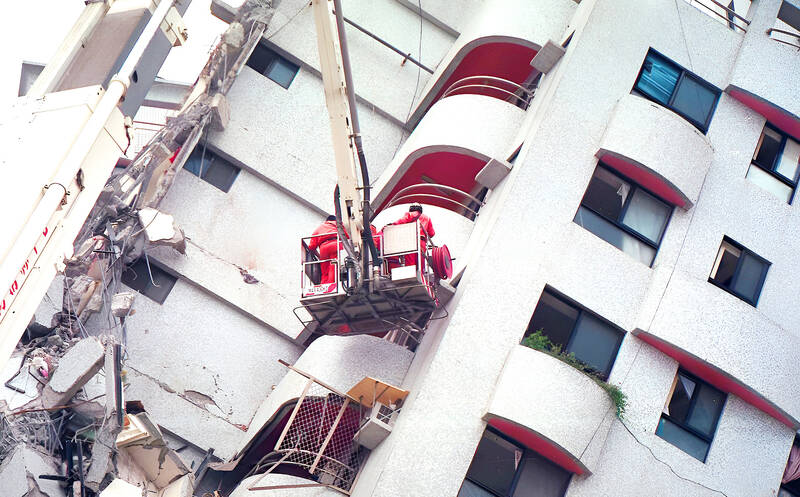對話 Dialogue
清清:你怎麼了?黑眼圈那麼重!
Qīngqing: Nǐ zěnmele? Hēiyǎnquān nàme zhòng!

Photo courtesy of Wikimedia Commons / 照片:Wikimedia Common 提供
華華:慘了!這麼容易就被看出來了!還不是地震害的!我怕得整夜都沒睡。
Huáhua: Cǎnle! Zhème róngyì jiù bèi kàn chūláile! Háibúshì dìzhèn hài de! Wǒ pà de zhěngyè dōu méi shuì.
清清:搖得很厲害嗎?我睡著了,完全沒感覺。
Qīngqing: Yáo de hěn lìhài ma? Wǒ shuìzháole, wánquán méi gǎnjué.
華華:天哪!你居然不知道昨夜有地震?你住幾樓?怎麼可能無感?
Huáhua: Tiān na! Nǐ jūrán bù zhīdào zuóyè yǒu dìzhèn? Nǐ zhù jǐ lóu? Zěnme kěnéng wúgǎn?
清清:昨天我可能太累了,倒頭就睡,天塌下來都與我無關。
Qīngqing: Zuótiān wǒ kěnéng tài lèile, dǎotóu jiù shuì, tiān tā xiàlái dōu yǔ wǒ wúguān.
華華:真羨慕你這種人!我家在十五樓,搖得像坐海盜船一樣,好擔心自己就看不到明天的太陽了!
Huáhua: Zhēn xiànmù nǐ zhè zhǒng rén! Wǒ jiā zài shíwǔ lóu, yáo de xiàng zuò hǎidàochuán yíyàng, hǎo dānxīn zìjǐ jiù kànbúdào míngtiān de tàiyáng le!
清清:今年的地震是比較頻繁,不過也不要太緊張,平常要準備好地震包,大地震來時,來不及跑就立刻趴下,躲在安全的地方觀察情況。
Qīngqing: Jīnnián de dìzhèn shì bǐjiào pínfán, búguò yě búyào tài jǐnzhāng, píngcháng yào zhǔnbèi hǎo dìzhènbāo, dà dìzhèn lái shí, láibùjí pǎo jiù lìkè pāxià, duǒ zài ānquán de dìfāng guānchá qíngkuàng.
華華:謝謝你啊!我希望我自己能做到這麼冷靜,學會跟這個避不開的天災和平共處。
Huáhua: Xièxie nǐ a! Wǒ xīwàng wǒ zìjǐ néng zuòdào zhème lěngjìng, xuéhuì gēn zhège bìbùkāi de tiānzāi hépíng gòngchǔ.
翻譯 Translation
Qingqing: What’s wrong with you? You have such dark circles under your eyes.
Huahua: Oh no! Is it really that obvious? It’s because of the earthquake: I was so scared that I didn’t sleep all night.
Qingqing: Was it really serious? I slept through it, didn’t feel a thing.
Huahua: Oh my! You didn’t even know there was an earthquake last night? Which floor do you live on? How could you not feel it?
Qingqing: Maybe I was just too tired yesterday, I fell asleep right away. Even if the sky fell down, it wouldn’t bother me.
Huahua: I envy people like you. I live on the fifteenth floor, it felt like being on a pirate ship, I was so worried I wouldn’t see the sun tomorrow.
Qingqing: Earthquakes have been more frequent this year, but don’t fret about it. Make sure you have an earthquake kit ready, and if a big earthquake hits, immediately drop to the ground and take cover in a safe spot so that you can assess the situation.
Huahua: Thank you! I hope I can be as calm as you. I want to learn to coexist peacefully with this unavoidable natural disaster.
生詞 Vocabulary
1. 地震 (dìzhèn) earthquake
2. 黑眼圈 (hēiyǎnquān) dark circles, to have bags under the eyes
3. 搖 (yáo) shake
4. 無感 (wúgǎn) numb
5. 倒頭就睡 (dǎotóu jiù shuì) [phrase] fall asleep immediately
6. 天塌下來 (tiān tā xiàlái) [phrase] sky falls down
7. 頻繁 (pínfán) frequent, often
8. 天災 (tiānzāi) natural disaster
教材音檔 Audio Files
國立清華大學華語中心提供
By National Tsing Hua University Chinese Language Center:

Autism spectrum disorder (ASD) is a neurological and developmental condition marked by disruptions in brain-signaling that causes people to behave, communicate, interact and learn in atypical ways. Autism diagnoses in the US have increased significantly since 2000, intensifying public concern over what might contribute to its prevalence. Here is what you need to know. HOW IS AUTISM DIAGNOSED? There are no objective tools for diagnosing autism, such as blood tests or brain scans. Instead, diagnoses are made based on observations and interviews. The term “spectrum” reflects the wide range of possible manifestations. Some people with ASD might have good conversation skills, while others might

A: When is the Lantern Festival? B: The festival is celebrated on the 15th day of the first month of the lunar calendar, which fell on Feb. 12 this year. A: Oh no! Did I miss the 2025 Taipei Lantern Festival? B: Yes, you did. But you can still go to the 2025 Taiwan Lantern Festival in Taoyuan, which will run until this Sunday. A: Let’s go admire the exuberant lanterns. A: 元宵節到底是哪一天? B: 就是農曆1月15日啊,今年則落在國曆2月12日。 A: 喔不,我是不是錯過了2025台北燈節? B: 是的,但你還可以去桃園的2025台灣燈會,活動將持續至週日。 A: 那我們去欣賞豐富的花燈秀吧! (By Eddy Chang, Taipei Times/台北時報張聖恩)

Every February, the small town of Ptuj in Slovenia comes alive with the vibrant celebration of its famous carnival. This festival, with its deep historical roots, is a cherished tradition where local residents come together to ward off the winter cold and embrace the arrival of spring. Participants dress up in furry costumes, transforming into kurenti, mythical monsters believed to drive away evil spirits and bring good fortune for the new year. Although the exact origins of the Ptuj carnival remain a mystery, it is firmly rooted in ancient Slavic and Illyrian cultures. The modern form of the carnival

A: What’s the theme of the 2025 Taiwan Lantern Festival’s main lantern? B: The theme is “Paradise,” and the main lantern is a snake-shaped “infinity” symbol that features a lighting show every half an hour. A: Cool, I heard that there are over 300 lanterns. B: There are even giant lanterns in the shape of Pikachu and some other popular Pokemon characters. A: Let’s go now. A: 2025台灣燈會主燈的主題是什麼? B: 主題是「無限樂園」!主燈的造型則是蛇形的數學「無限號」,主燈每半小時還有一次燈光秀。 A: 酷喔,聽說總共有300多件花燈作品。 B: 甚至還有皮卡丘和其他熱門寶可夢角色的巨型花燈呢。 A: 哇我們現在就出發吧! (By Eddy Chang, Taipei Times/台北時報張聖恩)